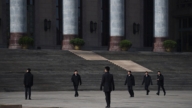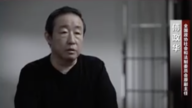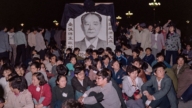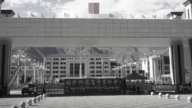【新唐人2012年10月29日訊】在即將召開的中共18大上,習近平將接替胡錦濤成為新一屆中共總書記。英國媒體指出,習近平接掌最高權力之後,要解決無數棘手問題,他必須與過去決裂,進行深入的政治體制改革。分析人士則強調,習近平別無他路,只有徹底拋棄中共,才可能解決中國目前的各種危機。
最近一期的英國《經濟學人》雜誌刊登文章,指稱習近平是「必須改變中國的人」。文章指出,當前中國大陸有無數社會問題,包括經濟增長放緩、貧富差距和貪腐現象嚴重、環境污染、有毒食品、掠奪土地、各地民眾群體抗暴事件此起彼伏等等。另外,特權階層為權力和財富爭鬥,有錢人則設法向國外移民和轉移資產,而普通民眾對社會不公的憤怒,更是已經讓中共面臨巨大的執政危機。
對此,美國「南卡羅萊納大學艾肯商學院」教授謝田向《新唐人》表示,中共過去30年,試圖以經濟改革促進經濟發展、走向小康,來證明它的執政合法性。但因為中共利益階層的貪婪,這條路也很快走到了盡頭。
美「南卡羅萊納大學艾肯商學院」教授謝田:「在中國當今社會,貧富差距越來越大,百姓在經濟衰退的情況下生活越發艱難。所以中共最後的所謂合法性基礎,現在看來已經基本不存在了。」
《經濟學人》文章認為,習近平接任後,要保持經濟發展和政治穩定極其困難。習近平必須有膽量與過去決裂。文章建議,習近平可以從多給人民一點權力做起,讓農民土地私有化、解決上訪者的問題。習近平還應該取消政府對金融業的掌控、開放報禁,用新聞自由來監督官員腐敗。
文章寫道,中共要獲得民眾信任,就必須進行深入的政治體制改革。習近平必須做出選擇,要嘛繼續鎮壓民眾,要嘛放鬆共產黨的控制。
謝田:「我覺得這兩種看法或者給習近平指的這兩種道路,都不是真正了解中國和中共的西方人一廂情願的想法,或者說都沒有認清中共的本質。在我個人看來,實際上習近平的這兩個選擇只是一個結果和一個結局。」
謝田深入分析,現在中國大陸每天大概有500起的大規模民眾抗暴事件,如果習近平繼續鎮壓,民眾迅速高漲的不滿和憤怒將會淹沒中共。如果習近平放鬆共產黨的控制,中共這60年的血債,包括文革、反右、六四屠殺、鎮壓法輪功、到最近的活體摘取器官,這些罪惡一旦被曝光,中共自然會被清算垮臺。
謝田:「習近平如果想自己主動一點的話,也許可以走出來胡錦濤沒有敢走的一條路,就是直接把中共解體。這樣的話,中共那些內部手上有血債的人,他們必須接受歷史的懲罰。 」
「全球自由信息運動」創辦人張新宇也表示,中共走到今天,很多問題已經根深蒂固,根本無法解決。
「全球自由信息運動」創辦人張新宇:「這樣的情況,他(習近平)只有一條,就是向蔣經國學習、或者向戈爾巴喬夫學習,把中國帶到民主、跟世界接軌這麼一個方向上來。我覺得這條路還是通的,如果走的話,他會得到很多人的支持。」
張新宇強調,如果不走這條路,習近平在中共嚴酷的內鬥中,很可能會面臨極大的危險。
採訪/劉惠 編輯/李謙 後製/蕭宇
The Economist: Xi Jinping “Must Change China”
At the upcoming 18th Party Congress, Xi Jinping
will succeed Hu Jintao as the new leader of the Chinese Communist Party (CCP).
UK media said that in facing “myriad social problems”,
Xi Jinping “must be ready to break with the past”
Xi must “venture deep into political reform.”
Political observers claim that Xi Jinping has
no other option but to disintegrate the CCP.
This would be the only universal remedy
for all crises that threaten today’s China.
The latest issue of The Economist magazine has
branded Xi Jinping as “the man who must change China.”
The article highlights “myriad social problems” in China,
including “a slowing economy, corruption, environmental
pollution, contaminated food, and land-grabbing by officials”.
In addition, “the rich and powerful fight
over the economy’s vast wealth.”
“The middle class protect their savings by sending
money abroad, and signing up for foreign passports”.
In addition, the poor are irritated at inequality. All these
have formed a huge ruling crisis to the CCP regime.
Xie Tian, professor at the University
of South Carolina- Aiken, commented.
He says that over the past 30 years, the CCP
has tried to use economic reform to boost China’s economy, to justify its ruling legitimacy.
However, greedy interests group’s
have brought this path close to ending.
Xie Tian: “In today’s China, the gap
between rich and poor is widening.
Under economic recession, life is getting
harder for ordinary Chinese people.
So the last justification of the CCP’s
alleged ruling legitimacy has gone.”
The Economist’s article stated that the task of “combining
economic growth with political stability” would be “proving increasingly difficult” for Xi Jinping as the new ruler.
“He must be ready to break with the past.”
The article suggested that “Mr Xi could start
by giving a little more power to China’s people.”
“Rural land, now collectively owned, should
be privatized and given to the peasants.”
“The judicial system should offer
people an answer to their grievances.”
Xi “should start to loosen the party’s
grip” on the financial sector.
“A free press would be a vital ally
in the battle against corruption.”
The article indicated that Xi Jinping “needs
to venture deep into political reform” in order to “restore his citizens』 faith in government”.
“Mr Xi can continue to clamp down on discontent,
or he can start to loosen the party’s control.”
Xie Tian: “I think these two paths for Xi Jinping are just views
of Westerners who don’t truly understand China and the CCP.
I’d say they haven’t discerned the nature of the CCP.
Personally, I think for Xi Jinping, the two
options will actually arrive at the same result."
Xie Tian analyzes that each day, around
500 mass protests occur in China.
If Xi Jinping continues to suppress them, the growing
social discontent and fury would inundate the CCP.
If Xi loosens the Party’s control, the CCP’s crimes
committed over past 60 years would be exposed.
These blood debts include launching the Cultural Revolution,
the Anti-Rightist Campaign, the Tiananmen massacre,
the persecution of Falun Gong and live organ harvesting.
With exposure of these evils, the CCP will naturally
collapse, and be brought to justice, says Xie Tian.
Xie Tian: “If Xi Jinping wants to be more proactive,
he may choose a path that Hu Jintao dares not to take.
That is, to disintegrate the CCP.
Then those CCP officials with blood debts
will have to face the punishment of history.”
Xinyu Zhang, founder of the Global Information
Free movement, remarks that the CCP has been mired in deep-seated problems.
Xinyu Zhang: “In this context, Xi Jinping’s only option
is to learn from Chiang Ching-kuo or Mikhail Gorbachev.
That is, leading China towards
democracy, I think it’s workable.
If he can choose this path, he’ll get a lot of support.”
Xinyu Zhang adds that if Xi Jinping fails to take this road,
he will probably face a great big danger from CCP infighting.

























